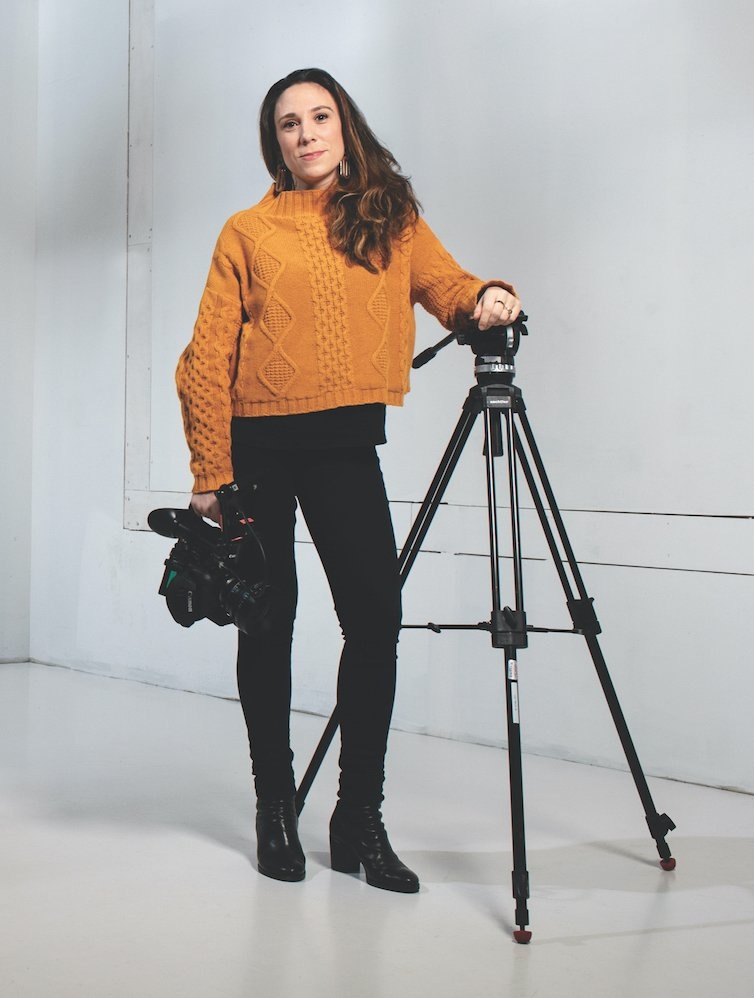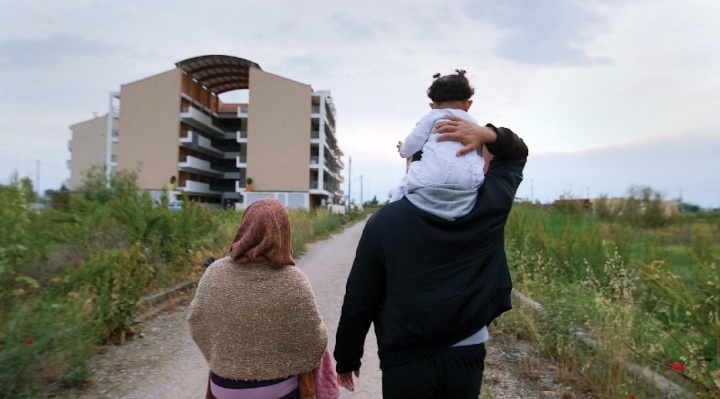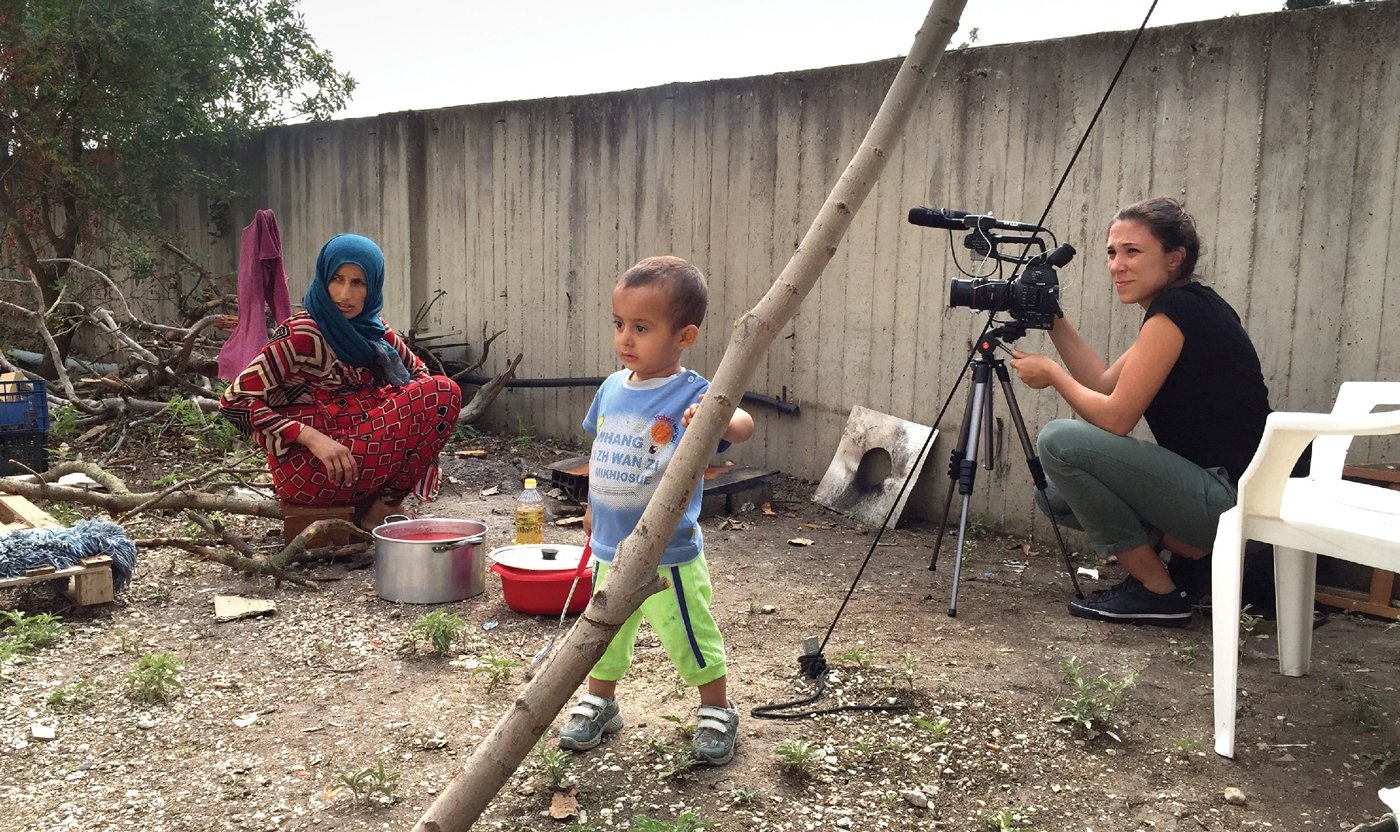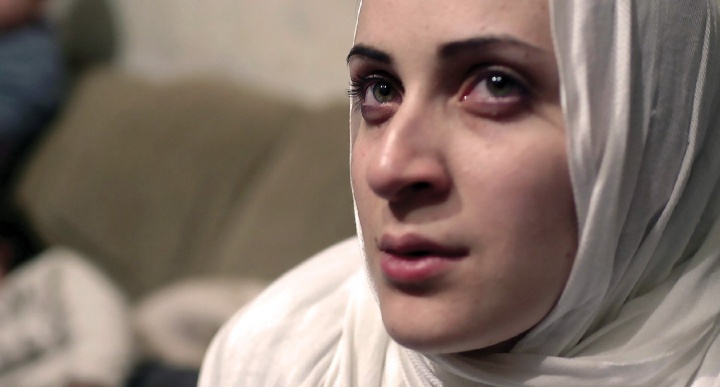Videographer Francesca Trianni ’11, JRN’13 puts a human face on the Syrian refugee crisis.
Columbia College | Columbia University in the City of New York
Videographer Francesca Trianni ’11, JRN’13 puts a human face on the Syrian refugee crisis.

Jörg Meyer
That’s the question Francesca Trianni ’11, JRN’13, a senior video producer at TIME, and her colleagues faced in summer 2016, as media outlets worldwide were saturated with images and news items about Syrian war refugees. The editors were looking for new ways to help their audience connect to the enormity of the crisis. “When you hear ‘refugee,’ you think you already know the story,” Trianni says.
Then Trianni’s attention was drawn to a little-known statistic: 1 in 10 women living in refugee camps was pregnant. She saw the potential to tell a human story with universal context, and pitched the idea of interviewing an expectant Syrian woman; her editor took it a step further and suggested documenting a year in the life of a family with a newborn.
Trianni eventually became part of the team whose reporting led to TIME’s 2018 multimedia project, Finding Home. The work also led to a milestone for Trianni as a videographer: She directed and filmed her — and TIME’s — first feature documentary, Paradise Without People, which had a sold-out screening in November at DOC NYC 2019 and is now playing at festivals around the country.

Nour and Yousef Altallaa, with their daughter, Rahaf, wait for asylum in Thessaloniki, Greece, after fleeing Syria. Nour found out she was pregnant the day the couple decided it was too dangerous to stay.
“I was so lucky to work with Lynsey and Aryn — they’ve both spent a lot of time in the Middle East, and they taught me a lot,” Trianni says. “We were all women — the three of us, and all the translators, too. They were incredible in helping to negotiate those relationships. We wouldn’t have been able to do it otherwise.
“War stories are often told from a male perspective, and we made a conscious effort to tell this story from a female point of view,” she says. “Growing up, my parents bought the newspaper every day, and all the serious, respected journalists I read were men. Working with women who had successful careers, seeing that that’s possible and how amazing they were — it really helped me.”
Back in New York, the team found its reporting had yielded even more stories. To reach a wider audience, TIME created four print cover stories, launched an Instagram page where they could tell stories daily and produced an interactive online feature. The multi-
media approach worked: Finding Home was nominated in 2018 for a News & Documentary Emmy Award and won the 2018 World Press Photo contest for Innovative Storytelling.
“I realized when I was filming that I was capturing something I’d never seen before,” Trianni says. “I’d watched a lot of films about refugees and immigrants, who were always portrayed as heroes or invaders — there was no middle ground. But these women and their husbands were just young couples caught in the middle of this huge humanitarian crisis and trying to figure it out.
“It’s a really hard time to tell a story that lives in the grey,” she continues. “These are human beings who are flawed, and they make mistakes. Sometimes it’s hard to connect with them. I filmed everything myself and I felt so much responsibility, especially at a time like this, the way we act with such fear toward the Other. But I wanted to show something different and true.”
Trianni never thought she would be a filmmaker, but got started on her path at the College. A native of Modena, a small town in Northern Italy (“we’re famous for balsamic vinegar”), she’d never heard of Columbia. She was part of a study-abroad program in high school and learned English in a small suburb outside of Boston; one of her teachers encouraged her to take the SAT and apply to American colleges. “Nobody in my town went to school in America,” she says. “My family and I knew nothing about the application process.” Trianni laughs, recalling that she was so shocked and excited to get into the College that her parents thought an intruder had broken into their home because of her screaming.
She started out studying political science. “I grew up with Berlusconi in power and saw how much of my country was being hurt by his presidency,” Trianni says. “I wanted to have agency to make a change in history.” A John Jay Scholar, she landed an internship with the first lesbian member of Italian parliament; though she found the experience interesting, she lost her taste for politics and was left questioning what she really wanted to do.
“It’s a really hard time to tell a story that lives in the grey.
But I wanted to show something different and true.”
Trianni’s future was changed by a book. In her junior year, she read The Sack of Rome: Media + Money + Celebrity = Power = Silvio Berlusconi by Alexander Stille. “It was such a great piece of journalism, fair and fascinating,” she says. “He helped me understand the history of my own country.” After finding out Stille was a professor at the Journalism School, Trianni wrote a fan letter thanking him for his work. He wrote back saying he needed an Italian speaker to help with his next book, and did she want to be his research assistant? She did.
“I helped him research a book about his family history and with a regular column he wrote for the Italian newspaper La Republica,” Trianni says. “He had a seat in understanding history. I couldn’t believe that was a job!”
Stille, the San Paolo Professor of International Journalism, encouraged Trianni to apply to the J-School and has continued to be a mentor. “Francesca has turned herself into a first-rate journalist,” he says. “Her work combines deep passion, powerful commitment and great journalistic integrity. She tracked immigrant families for more than a year to find a compelling way to tell their stories and did it so well that she managed to overcome a climate of general indifference around those issues.”

She didn’t want to stop. After a six-month internship with Reuters, Trianni landed at TIME in 2014, working on breaking news stories. Ready for something more enterprising, she created a six-minute video about Emma Sulkowicz ’15 and presented it to her bosses; soon after she was creating short documentaries and eventually was producing video exclusively.
Trianni has continued to get feedback about Finding Home and Paradise Without People since the premiere in October. “Teachers have told me they use the interactive story in their classrooms, and I’ve heard from others that they’ve never seen refugees portrayed that way. It feels like such an accomplishment.”

Taimaa, a Syrian refugee from Idlib, moments after she arrived in her new home in Estonia.
Trianni is eager to make more feature films and learn new ways to reach and connect with an audience. “I liked doing something that made viewers uncomfortable, that maybe made them rethink something they thought they already knew,” Trianni says. “Challenging people’s assumptions about the world around them — that’s what journalism does, right?”

Published three times a year by Columbia College for alumni, students, faculty, parents and friends.
Columbia Alumni Center
622 W. 113th St., MC 4530, 6th Fl.
New York, NY 10025
212-851-7852
cct@columbia.edu

Columbia Alumni Center
622 W. 113th St., MC 4530, 4th Fl.
New York, NY 10025
212-851-7488
ccalumni@columbia.edu